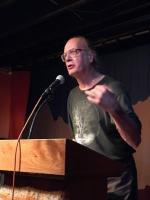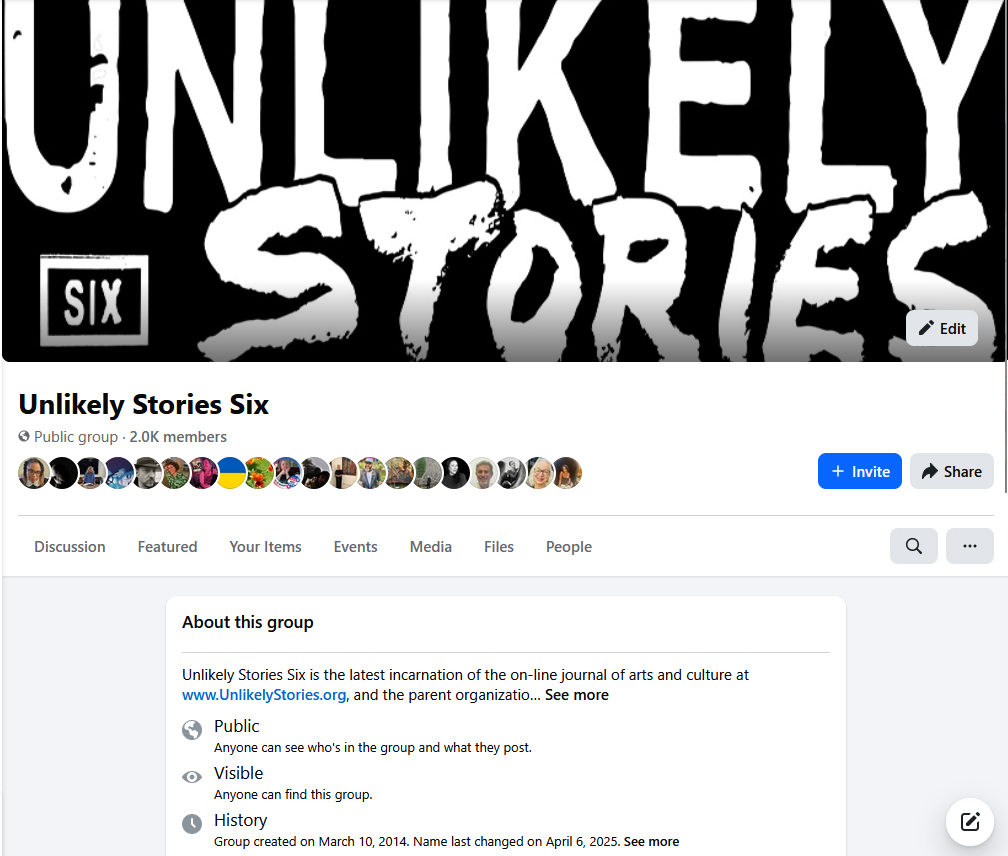The Cabin at the End of the World, Douglas Cole (Unsolicited Press, ’24); Wondermental, Nico Vassilakis (Pulley Press, ’24); and Mooncalf Almanac, Matt Schumacher (Bottlecap Press, ‘24)
by dan raphael
Not to be confused with The Restaurant at the End of the Universe, Douglas Cole’s The Cabin at the End of the World, winner of the Best Book Award in Urban Poetry, takes us to a handful of “places,” somewhat aligned with the book’s sections.
Most of the poems in the first section, “Block 23,” have an urban feel to them:
“In the street below, a woman with a chainsaw and a pick,
a child listening to a tree, thinking, why was there a split?
Old men working their asses off hauling greasy produce
Boxes down the long alleyways off King Street” (Mind Blank as a Room)
Cole has an eye for the unusual, for sudden turns and unexpected choices, and they all flow together. These prose poems show Cole’s skill in narrative writing and voice, creating a scene with minimal language, a kind of opposite of the old line that one picture is worth a . . .
In line with its title, “American Dharma,” the second section’s poems are suggestive of an internal place, with humor and often a tongue in cheek approach to “dharma.” Or maybe some of the zen-ish moments really are intended that way. Here’s a whole poem, “Eternity Bookstore”:
“Cockeyed shelves, out-of-print books,
Gadgets and rubber eyes,
Glow in the dark skeletons
And a dusty magic phone
You can use to call your past lives.”
The feel in this section is a little less urban than the first, with shorter, thinner poems, and a few more internal moments.
Many of the poems in the third section, “The Talking Stone,” tell us where we are in the first line. An example of three consecutive poems:
“I’m walking home from Charlie and Yumi’s house”
“Highway patrolman on the stretch of road”
“The white droning of a shredder truck”
Crisp wording, mostly shorter poems, often starting with a place but many are about some form of displacement:
“I feel like I’m driving forever—at every stop
lifetimes slide up against the back of my head—
even you float by one a doppler wave
bending into a siren wail in the dark—” (Lonesome Driver)
Towards the end of the book, Cole stretches out a little. The third and second to the last poems of the book are the only two that cover more than one page. “Distances” stretches to a seventh page, a prose poem in three-line stanzas. “West Cove” is in five sections, with a strong narrative focus on the world around his “cabin,” which is probably on the Pacific coast, which horizon could be seen.
Cole shows us a wide variety of places, from specific blocks, to the minds of odd individuals and imaginary locals, all while engaging our curiosity and empathy. He is a great storyteller, the ease of his language often hiding his skill, range and intelligence. I haven’t met him, but see him as someone you’d easily miss, sitting in a café corner taking notes or talking is observations into his phone. The ‘I’ in these poems is sometimes a persona, but when it is, doesn’t tell me much about Douglas Cole, the man inside the poet.
Nico Vassilakis went through a major relocation. A long-time New Yorker, he moved to Greenville, Illinois, a city of 7,000 not far from St. Louis, five years ago. Wondermental is the result of that move. As Vassilakis says in the preface: “Wondermental is a weave of bliss and turmoil, a found text in nature, leaning against a hot dog stand. It’s a film playing on the curve of a silo.”
Best known for his visual poetry, Vassilakis’ texts tend towards the short-lined, often with stanzas of just a line or three, as in the opening poem “Complying”:
“May I step in here
For a second
Her rings were slippery with butter
The unrelenting
Duodenum follies
My personal history with nicotine
addiction”
A sense of not found poetry, but poetry found in observed bits and pieces. The wonder of being a stranger in a strange land, operating at a different speed, but not to the detriment of seeing and feeling. And he can sit still for a minute and let things sink in, as in “As the Citizenry Relocates”:
“A pair of sunflowers, he thought,
with middles staring their way into
the far end of an ashtray. Nothing
comes out right here. These winged
things breathing all around us, A
rhythm that keeps the chairs moving.”
I appreciate his multiple levels of consciousness and language, what seems simple also has contextual resonance. His paying job as a home healthcare therapist gives him access to the world around him that most newcomers would not have. His maturity, intelligence, and joy with language and life gives his poems insight and energy that I as a reader can’t stop taking in. This from "The Ridden Mower," one of the sections of the twenty page “So Equals Do”:
“I sense deviation, a ripple at the
central intake of this poem
Is it food or a relationship
It’s the exchange of money, really
I’ll throw chiaroscuro in just for
contrast. The difference between
authority and power
Keeps us subservient and giddy with
a bag of treats”
While there’s plenty of wonder in Wondermental, there are also discoveries and conclusions. These poems go way beyond the mental—how the title sounds like fundamental—to the real, the human, what can join us together. Threaded through these poems is that they’re not so much about the specific change Vassilakis is going through, but that it is a major change, and he’s trying to find a balance tween re-settling and being un-settled.
I’ve met and exchanged several bear hugs with Vassilakis, who matches my 6’6” height and a little bigger boned. He has a strength to take anything in stride with the inner tenderness to wonder about his choices. The poems overall are more about what he’s reacting with in Illinois then how he’s feeling about it internally, partially masked by humor and attitude:
“Poetry is a jive turkey in this scenario
All your handheld devices getting
soaked in a pool of information porn
The accurate and the inaccurate
Somewhere beyond what’s breathable
It’s too painful to edit anymore” (Walter Cronkite)
While Cole went through neighborhoods and places as an observer taking notes, and Vassilakis is reporting out from a new world he’s now in, Schumacher is making up worlds and characters as he goes along.
“Space is the place” is often applied to Sun Ra, but it also works for Matt Schumacher’s Mooncalf Almanac. The book’s middle section is “Haikus from the Moons of Jupiter.”
“Tentacles form from
Crimson storms, hidden oceans
Under my eyelids”
“Themisto’s chemist
of mist construes the lost moon
that escapes telescopes”
Something about the mix of haiku with places we can never go. Science fantasy poetry?
In the first, untitled section, Schumacher blends mythology, imagination and unexpected sciences with daily occurrences like spiders, walking and, especially, weather:
“What wan, pale shades we’ve taken on
Luminous broo from impact crater and freak meteor.
Hair and eye from storms. Limbs like glittering sickles.
Surfaces and skin a wilderness, uninhabitable” (The Green Weatherman’s Otherworldly Forecast)
While the haikus are telescopic, these poems often get microscopic then blossom into unexpected language and imagery, which abounds throughout the book;
“Model hollow globe shown so we
know how badly we’ve blown it:
as holes left by deforestation and CO2
usher us into more austere future rooms,
our story’s best told in vanishing thread.
Tattered raised flag for the dead.
Protest against careless fools.” (To a Spiderweb)
Yes, Schumacher’s wild imagination has some earthly roots, in compassion, in his observations of our immediate reality. Then there’s the world of Mooncalf, as seen by the poet. Mooncalf’s world is akin to traditional faerie stories:
“how do you surf the glitter of the dew?
how do you outfit the will o’ the wisp?
what lawless guffaw or crispy giggle
have trilled to the valley to echo?” (Mooncalf Come Back)
But Mooncalf is also a myth for the future, for a world unlike the one we seem headed for;
“mooncalf is it you? come back
show humans how not to ruin and use
help us own our dead zones
and heal sea levels
wear your suit of weather patterns
please bring back the dying species” (Mooncalf Are You Out There)
I’m strongly drawn to writing with creative language and circumstances. It’s also good to have an open heart and a clear vision of the present. In these Trumpian and over-teched times we need to step back from the gloom and imagine a hopeful future. Maybe call on examples to help us like Vandana Shiva, Wendell Berry and Mooncalf. Schumacher doesn’t need AI to boldly (& playfully) go beyond, employing deep and wild Artistic Imagination.





Add comment